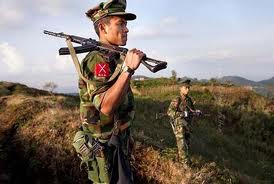Political reforms under President Thein Sein’s military-backed government threaten to be overshadowed by a major conflict in the country’s northernmost state.

Although Burma has seen some reforms in recent months, Thein Sein’s government is facing renewed criticism from human rights groups for overseeing a brutal war in Kachin State.
The Burma Army has been fighting against the Kachin Independence Army (KIA) since hostilities started in June last year.
Free Burma Rangers (FBR), a grassroots NGO with ground operations on the China-Burma border; have estimated that the war has so far led to at least 50,000 internally displaced people as they flee fighting between the Burma Army and the KIA.
According to FBR there have also been many scores of human rights abuses including “extrajudicial killings, imprisonment and torture.”
The report claims that Burma’s Army has been burning dozens of villages and conducting indiscriminate mortar bombardments in population centre’s as recently as two weeks ago, with as many as “12,000 soldiers” involved.
Although the UN recently managed to send a limited number of aid convoys into isolated parts of Kachin State, many displaced people remain in dire need of humanitarian assistance, and with the monsoonal season approaching, conditions are expected to become even more desperate.
The militarization of Kachin State comes as UN secretary General Ban Ki Moon visited the capital Naypyidaw to address the country’s parliament to urge further steps be taken towards democracy.
Aung San Suu Kyi and 42 members of her political party, the NLD, have yet to enter parliament after refusing to swear that they would “safeguard” an army-created constitution, instead asking for the wording be changed to “respect,” this is the first clear sign of open tensions between Thein Sien and the NLD since the April 1st by election.
Ban Ki Moon’s visit comes amid a burst of diplomatic activity to try to bring the resource rich pariah state into the international fold, including visits by both United States Secretary of State Hillary Clinton in November last year, and British PM David Cameron in mid April.



